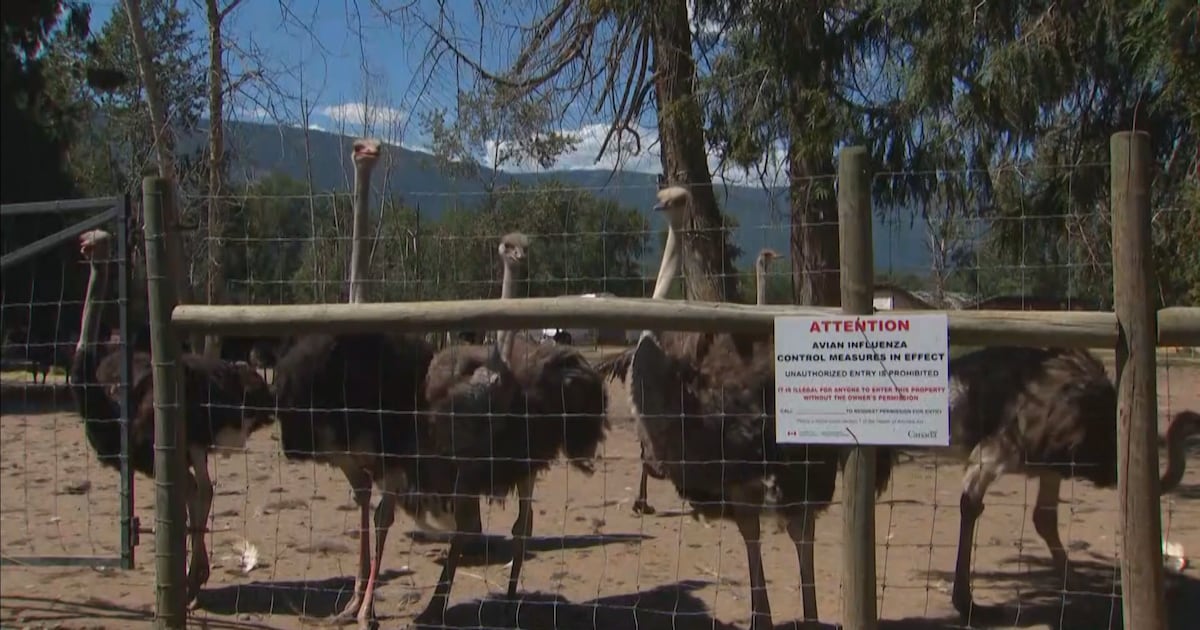Health
Residents near B.C. Ostrich Farm Face Turmoil Amid Avian Flu Fight

Residents living near the Universal Ostrich Farm (UOF) in Edgewood, B.C., are expressing mounting frustration as the farm’s owners continue to contest a government-ordered cull due to avian flu. With the situation drawing international attention, local neighbours report feeling neglected and anxious about potential health risks posed by the farm’s remaining ostriches.
For the past eight months, community members have grappled with uncertainty as UOF fights to protect its flock. Kelley Soroka, a resident near the farm, emphasised the growing discontent among locals. “The valley is in quite a turmoil,” she stated, reflecting the distress felt by many in the area. Protests have emerged, attracting demonstrators from across British Columbia to Edgewood.
The cull was initially mandated in December 2022 after some birds tested positive for avian influenza. While 69 ostriches died, nearly 400 have survived, prompting the farm to argue that their remaining birds are healthy. “We have had no illness and no deaths on our farm for 223 days. They are thriving. Our herd of ostriches is a living vault of immunity,” said Katie Pasitney, the farm’s spokesperson, during a recent press briefing.
Concerns for livestock health persist among neighbours. Jim and Millie McFarlane, cattle farmers in the vicinity, revealed their anxiety about being in a secondary quarantine zone. “When fall comes and we ship our cattle to market, is that going to be a factor in the price that we get for our cattle?” Millie questioned. Pasitney dismissed their concerns, asserting that linking UOF’s situation to cattle pricing is misleading.
Local residents have also voiced concerns about their representation by elected officials. On August 21, 2023, Scott Anderson, the Conservative Member of Parliament for Vernon-Lake Country-Monashee, issued a statement regarding the Federal Court of Appeal’s recent decision to uphold the Canadian Food Inspection Agency (CFIA) cull order. Anderson expressed disappointment with the CFIA’s “stubborn refusal to allow testing, engage with senior academics in the field, or consider alternatives to mass culls.”
The MP acknowledged hearing from constituents with mixed feelings about the cull but emphasised that personal attacks against UOF’s owners are irrelevant. Residents like Randy Donselaar feel Anderson has not adequately represented community concerns. “He is not representing the voice of our community… and I think he’s either blind to that or he doesn’t care,” Donselaar remarked.
The situation has attracted attention from notable figures, including U.S. television personality Dr. Mehmet Oz, who has offered to relocate the ostriches to his ranch in Florida. He has publicly called on the Canadian government to intervene and save the birds. Both Donselaar and Soroka expressed frustration over external influences, with Soroka stating, “It really bothers me that the Americans are involved.”
What began as a local protest against the cull has evolved into a broader political issue, according to many residents. “It’s become very political, and the birds are just a non-issue right now,” said Debra Pion, another long-time resident. Angela Rasmussen, a virologist from the University of Saskatchewan who supports the CFIA’s decision, pointed out that such offers to relocate ostriches undermine public health regulations. “There has really been a full-scale attack on American public health practices… trying to interfere in Canada’s mechanisms for instituting evidence-based responses to potential pandemic pathogens,” she explained.
In a statement to CTV News, Pasitney reiterated that the ongoing battle is not based on any risk to public health or safety. “Our ostriches have been healthy the entire time. The real concern is that the CFIA continues to refuse to test the birds, even after so many months with no illness or deaths,” she said. She suggested that local residents should direct their concerns to the CFIA for better policy and outbreak response.
The CFIA maintains that the healthy appearance of the ostriches does not eliminate the risk of spreading the avian flu. “It increases the risk of reassortment or mutation of the virus, particularly with birds raised in open pasture where there is ongoing exposure to wildlife,” the agency stated, adding that there are concerns about potential transmission from ostriches to humans. Following the Federal Appeal Court’s ruling, the CFIA is now authorised to cull the remaining ostriches at any time, leaving the community in a state of apprehension as they await the outcome of this ongoing dispute.
-

 Science3 months ago
Science3 months agoToyoake City Proposes Daily Two-Hour Smartphone Use Limit
-

 Top Stories3 months ago
Top Stories3 months agoPedestrian Fatally Injured in Esquimalt Collision on August 14
-

 Health3 months ago
Health3 months agoB.C. Review Reveals Urgent Need for Rare-Disease Drug Reforms
-

 Technology3 months ago
Technology3 months agoDark Adventure Game “Bye Sweet Carole” Set for October Release
-

 World3 months ago
World3 months agoJimmy Lai’s Defense Challenges Charges Under National Security Law
-

 Lifestyle3 months ago
Lifestyle3 months agoVictoria’s Pop-Up Shop Shines Light on B.C.’s Wolf Cull
-

 Technology3 months ago
Technology3 months agoKonami Revives Iconic Metal Gear Solid Delta Ahead of Release
-

 Technology3 months ago
Technology3 months agoApple Expands Self-Service Repair Program to Canada
-

 Technology3 months ago
Technology3 months agoSnapmaker U1 Color 3D Printer Redefines Speed and Sustainability
-

 Technology3 months ago
Technology3 months agoAION Folding Knife: Redefining EDC Design with Premium Materials
-

 Business3 months ago
Business3 months agoGordon Murray Automotive Unveils S1 LM and Le Mans GTR at Monterey
-

 Technology3 months ago
Technology3 months agoSolve Today’s Wordle Challenge: Hints and Answer for August 19









